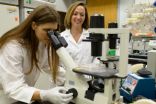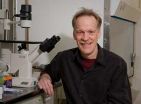(Press-News.org) GAINESVILLE, Fla. -- Noroviruses are pernicious intestinal viruses. They cause violent vomiting and diarrhea, and people ill with the virus remain contagious up to three days after they seem to recover.
Although a vaccine for these viruses is in clinical trials, there is still no medication to combat them. That's in part because researchers have not been able to culture human noroviruses so they can test potential treatments -- until now, according to a study by University of Florida Health researchers published Friday, Nov. 7 in the journal Science.
UF Health researcher Stephanie Karst, Ph.D., has found a way to grow a human norovirus by identifying a cell it targets in the intestine.
"The biggest hurdle to doing norovirus research for its entire history -- it was discovered in 1972 -- has been that we can't culture the human viruses in a cell culture dish," said Karst, an associate professor in the department of molecular genetics and microbiology in the UF College of Medicine. "That complicates every aspect of research. We can't study how it replicates, we can't test therapeutics and we can't generate live virus vaccines."
According to the Centers for Disease Control and Prevention, in the United States, human noroviruses cause 19 to 21 million cases of illness per year, and contribute to 56,000 to 71,000 hospitalizations and 570 to 800 deaths, mostly in young children and older adults. Noroviruses are resistant to many common disinfectants. Very little of the virus is needed to infect a host, so a surface may still contain enough virus to infect a person even after it is cleaned.
Previously, researchers speculated that noroviruses primarily target intestinal epithelial cells, which line the intestine and protect it from pathogens, Karst said. However, this new research demonstrates that the virus targets B cells, a type of white blood cell common in the intestine.
"That's a big surprise," Karst said. "You would think that any virus that's going to target the intestine would instead target the intestinal epithelial cells because that's the first cell the virus is going to encounter."
Researchers also were surprised to find that bacteria present in the body's gut flora, also known as commensal bacteria, helped the human norovirus infect B cells. Karst said scientists have long known that noroviruses need a particular kind of carbohydrate to infect cells.
"What we've shown is that noroviruses attach to that carbohydrate expressed on commensal bacteria, and that this interaction stimulates viral infection of the B cell," Karst said. "This is a really exciting, emerging theme. A variety of intestinal viruses seem to exploit the bacteria that are present in our intestines all the time. These viral infections are enhanced by the presence of bacteria in the gut."
UF research scientist Melissa Jones, Ph.D., a co-author on the paper, said the idea to study B cells came from Karst's research on mouse noroviruses. UF scientists detected virus in Peyer's patches, pockets of lymphoid nodules that line the intestine and survey the organ for pathogens.
This system can now be used to study norovirus replication and assess effectiveness of therapeutics and disinfectants, though more work needs to be done to increase its efficiency. Karst and Jones said while this is the first time researchers have been able to culture a human norovirus, the virus does not replicate to high levels in the current system, which hinders growth of the virus in the laboratory.
"Ultimately, this system should open up new avenues for norovirus vaccine and antiviral drug development," Karst said.
INFORMATION:
In a new, in-depth research project, Queen's professors Rob Siemens (Urology) and Christopher Booth (Cancer Care and Epidemiology) investigated what affect higher volume hospitals and surgeons had on the outcomes of patients undergoing a radical cystectomy for bladder cancer in Ontario.
Using data provided by the Institute for Clinical Evaluative Sciences (ICES) the investigators studied 2,802 patients who underwent the procedure between 1994 and 2008 in Ontario and found that higher volume hospital and surgeons were associated with less post-operative complications and ...
BUFFALO, N.Y. -- Preschoolers whose parents have rules about what their children can and cannot eat have healthier eating habits than those raised without such rules, according to a new study by pediatrics researchers at the University at Buffalo.
The study also provides new information on how toddlers' ability to self-regulate, or control, their emotional and behavioral impulses influences their eating habits two years later, depending on the presence or absence of parental food rules.
The research is being presented on Nov. 7 at ObesityWeek 2014 in Boston. ObesityWeek ...
As if having a heart attack isn't bad enough, cardiologists know that the worst damage may actually occur after it's over.
Blocked arteries are typically the trigger, stopping the flow of blood and starving the heart muscle of oxygen. But when the blockage is removed and the blood comes rushing back, it wreaks havoc of its own. The result is called reperfusion injury, a life-threatening flood of inflammation and cellular destruction that has stumped scientists for 40 years.
Now, however, a potentially groundbreaking study by Fred Hutchinson Cancer Research Center scientists, ...
Seok Kang, associate professor in the UTSA Department of Communication, collaborated with Korean researcher Jaemin Jung to study the smartphone habits of college students in the United States and South Korea. The researchers were particularly interested in the type and amount of information college students from both countries disclose. The study was published in Computers in Human Behavior.
The two countries were selected due to the high rates of smartphone ownership among their young adults. Eighty percent of Americans own smartphones while the ownership rate in Korea ...
Researchers led by Dr. Debra Auguste, associate professor, biomedical engineering, in the Grove School of Engineering at The City College of New York, have identified a molecule that could lead to developing treatment for one of the most aggressive forms of breast cancer.
Triple negative breast cancers (TNBCs) have a high mortality rate owing to aggressive proliferation and metastasis and a lack of effective therapeutic options. However, Professor Auguste's team, discovered the overexpression of intercellular adhesion molecule-1 (ICAM-1) in human TNBC cell lines and tissues, ...
Employers know that dramatic changes in the workplace, such as the start of the "busy season" or a new, more demanding boss, can cause employees to act out in ways that hurt the bottom line. But a new study suggests that companies may be underestimating the impact of such behavior because they assume it only happens immediately after a stressful change.
The research from SF State organizational psychologist Kevin Eschleman shows that many employees wait weeks or months before engaging in "counterproductive work behaviors," like taking a longer lunch or stealing office ...
Two NASA and one European spacecraft, including NASA's MAVEN mission led by the University of Colorado Boulder, have gathered new information about the basic properties of a wayward comet that buzzed by Mars Oct. 19, directly detecting its effects on the Martian atmosphere.
Data from observations carried out by MAVEN, NASA's Mars Reconnaissance Orbiter (MRO) and the European Space Agency's Mars Express spacecraft revealed that debris from the comet, known officially as Comet C/2013 A1 Siding Spring, caused an intense meteor shower and added a new layer of ions, or charged ...
A new study by Brigham Young University and the Fox affiliate in Salt Lake City shows that choosing to broadcast a local favorite isn't always the smartest ratings decision.
The new study shows how TV execs should decide which games to air when the home-town team isn't playing - or in markets like Utah that don't have their own team. Traditionally the most popular teams in Utah have been the Broncos, Cowboys and 49ers.
"When you look at the difference between the average team effect, like say the Miami Dolphins, and the next top tier after the Denver Broncos, the results ...
HOUSTON -- ( Nov. 7, 2014 ) -- By transforming human scar cells into blood vessel cells, scientists at Houston Methodist may have discovered a new way to repair damaged tissue. The method, described in an upcoming issue of Circulation (early online), appeared to improve blood flow, oxygenation, and nutrition to areas in need.
Cardiovascular scientists at Houston Methodist, with colleagues at Stanford University and Cincinnati Children's Hospital, learned that fibroblasts -- cells that causes scarring and are plentiful throughout the human body -- can be coaxed into becoming ...
LAWRENCE -- New study results from the University of Kansas to be presented this weekend at the Gerontological Society of America's annual meeting in Washington, D.C., bolster the adage that "heart healthy is brain healthy." The investigation shows neighborhoods that motivate walking can stave off cognitive decline in older adults.
"People can walk either to get somewhere or for leisure," said Amber Watts, assistant professor of clinical psychology, who will share her findings at a symposium Sunday, Nov. 9, in Liberty Salon K at the Washington Marriott Marquis.
"Depending ...






